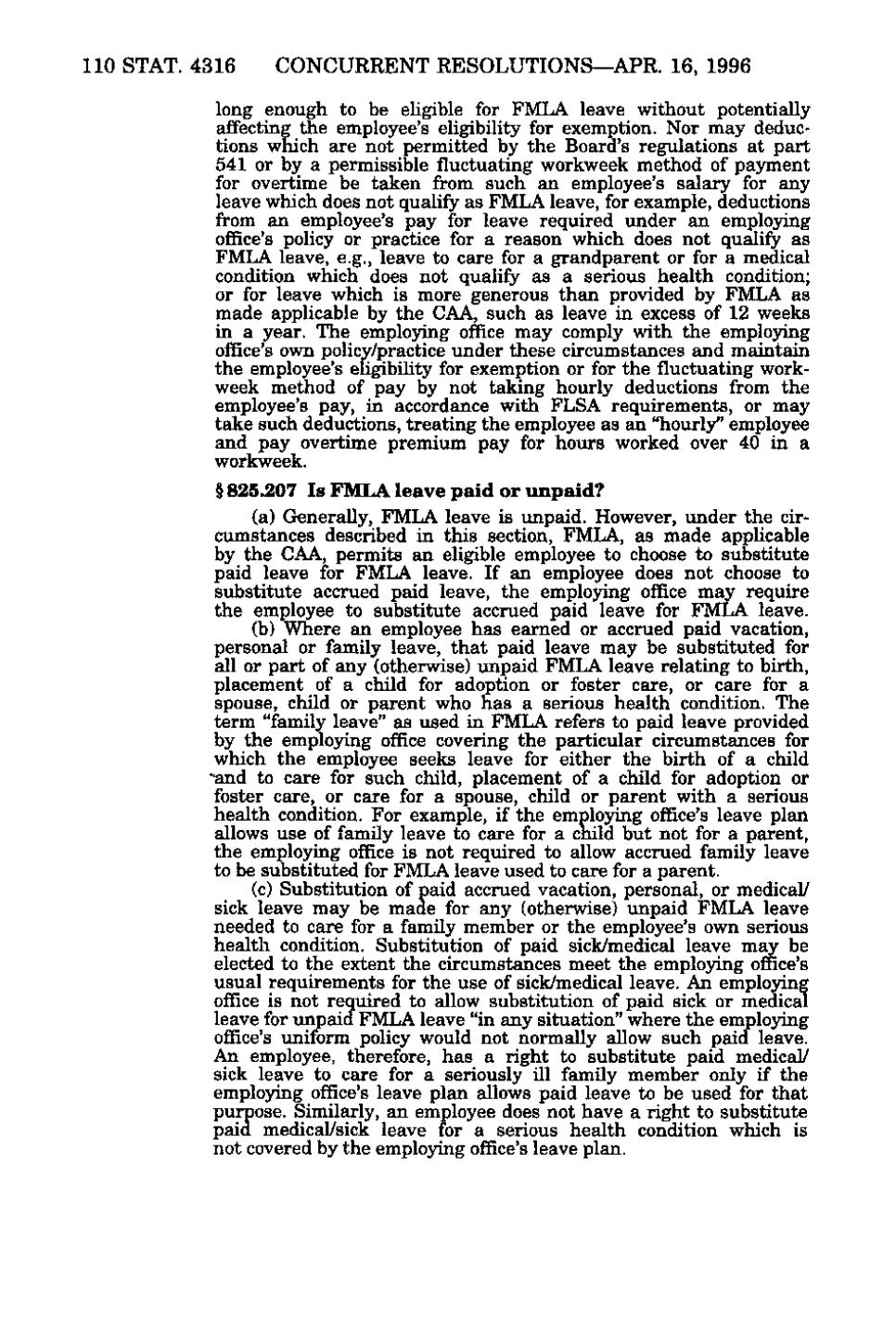110 STAT. 4316 CONCURRENT RESOLUTIONS—APR. 16, 1996 long enough to be eligible for FMLA leave without potentially affecting the employee's eligibility for exemption. Nor may deductions which are not permitted by the Board's regulations at part 541 or by a permissible fluctuating workweek method of payment for overtime be taken from such an employee's salary for any leave which does not qualify as FMLA leave, for example, deductions from an employee's pay for leave required under an employing office's policy or practice for a reason which does not qualify as FMLA leave, e.g., leave to care for a grandparent or for a medical condition which does not qualify as a serious health condition; or for leave which is more generous than provided by FMLA as made applicable by the CAA, such as leave in excess of 12 weeks in a year. The employing office may comply with the employing office's own policy/practice under these circumstances and maintain the employee's eligibility for exemption or for the fluctuating workweek method of pay by not taking hourly deductions from the employee's pay, in accordance with FLSA requirements, or may take such deductions, treating the employee as an "hourly" employee and pay overtime premium pay for hours worked over 40 in a workweek. §825.207 Is FMLA leave paid or unpaid? (a) Generally, FMLA leave is unpaid. However, under the circumstances described in this section, FMLA, as made applicable by the CAA, permits an eligible employee to choose to substitute paid leave for FMLA leave. If an employee does not choose to substitute accrued paid leave, the employing office may require the employee to substitute accrued paid leave for FMLA leave. (b) Where an employee has earned or accrued paid vacation, personal or family leave, that paid leave may be substituted for all or part of any (otherwise) unpaid FMLA leave relating to birth, placement of a child for adoption or foster care, or care for a spouse, child or parent who has a serious health condition. The term "family leave" as used in FMLA refers to paid leave provided by the employing office covering the particular circumstances for which the employee seeks leave for either the birth of a child and to care for such child, placement of a child for adoption or foster care, or care for a spouse, child or parent with a serious health condition. For example, if the employing office's leave plan allows use of family leave to care for a child but not for a parent, the employing office is not required to allow accrued family leave to be substituted for FMLA leave used to care for a parent. (c) Substitution of paid accrued vacation, personal, or medical/ sick leave may be made for any (otherwise) unpaid FMLA leave needed to care for a family member or the employee's own serious health condition. Substitution of paid sick/medical leave may be elected to the extent the circumstances meet the employing office's usual requirements for the use of sick/medical leave. An employing office is not required to allow substitution of paid sick or medical leave for unpaid FMLA leave "in any situation" where the employing office's uniform policy would not normally allow such paid leave. An employee, therefore, has a right to substitute paid medical/ sick leave to care for a seriously ill family member only if the employing office's leave plan allows paid leave to be used for that purpose. Similarly, an employee does not have a right to substitute paid medical/sick leave for a serious health condition which is not covered by the employing office's leave plan.
�
